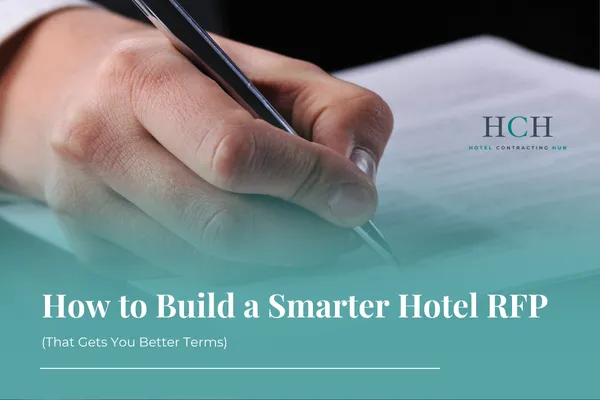
How to Build a Smarter Hotel RFP (That Gets You Better Terms)
Most planners think negotiation starts when the contract shows up—but by then, the hotel has already framed the deal.
If you want better terms, fewer surprises, and more negotiating power, it all starts with how you write your RFP.
Here’s how to build one that sets clear expectations, earns stronger proposals, and sets you up for contract success.

Why Is the RFP So Critical?
Hotels use your RFP to evaluate risk. When the request is vague, they default to protective terms—higher attrition, stricter cancellation policies, and less flexibility.
But when your RFP is specific, planner-forward, and well-structured, it does three things:
Frames the deal before the contract arrives
Shows you’re a serious, experienced negotiator
Puts you in control of the process—not reacting to it

What Should You Include in Every RFP?
Here’s what I recommend to every planner I consult with:
1. Pattern and preferred dates Ask if lower rates and better concessions are available on alternative dates clude alternate dates if better rates are available.
2. Room Block by Day Include suites, and if special room types are required.
3. Meeting space List times, required rooms (GS, breakouts, meals) along with capacities and layouts (classroom, theater, round, etc.) AV requirements.
4. Concessions Spell out what matters most to you: comps, suite upgrades, discounted or waived resort fees and parking, no attrition, etc. Be specific. Hotels will tailor their proposals accordingly.
5. Key Terms You Expect You can absolutely include sample language for critical items—like cancellation, rebooking rights, or force majeure. This sets the tone that your contract won’t be one-sided.
(Pro tip: all members get access to our Contract Clause Library with vetted language you can drop right into your RFPs.)
6. Your Decision Timeline Let hotels know when and how you’ll make your decision. This prevents last-minute games and encourages transparency from their side.
7. History Include a brief summary of your organization and the purpose of the event. Include three years of cumulative room night actualization, food & beverage spend, and details of any ancillary services utilized (e.g., AV, spa, etc.), along with the names of the corresponding hotels.

What Not Do When Sending a Hotel RFP
Blasting the same RFP to 20 Hotels — Hotels can see when an RFP has gone out to many competitors. It signals low commitment, which can result in them ignoring the RFP or a generic proposal.
Failing to include the items mentioned above — Without context you are not taken seriously
Not responding to their call one you send the RFP — Hotels don’t know how competitive they need to be or if they’re wasting time.
And if you’re not sure what to ask for or how far you can push? That’s exactly what our consulting sessions are for.And if you’re not sure what to ask for or how far you can push? That’s exactly what our consulting sessions are for.
How Do You Evaluate Responses Like a Pro?
Don’t just compare rate and room block. Look deeper:
Did they acknowledge your terms?
Did they ignore your cancellation language?
Are concessions clear or vaguely worded?
This tells you how the contract negotiation will go. If they’re slippery now, they’ll be slippery later.
Want Support on Your Next RFP?
You don’t need to figure it out alone. Here’s how we can help:
📘 Access our Clause Library (included in every membership)
📝 Book a Rapid Review Session for fast, expert RFP feedback – $150
📞 Start with a Free 15-Minute Consultation to talk through your needs
At Hotel Contracting Hub, we help you take control before the contract ever arrives. And it all starts with a smarter RFP.

